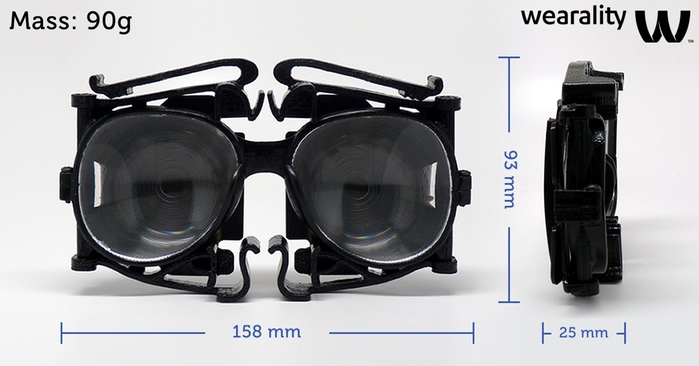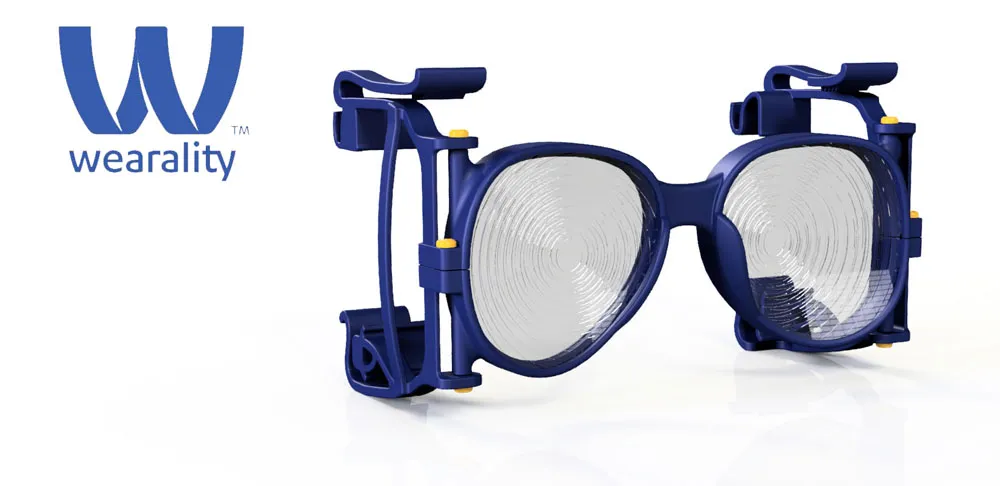With four days left to go, virtual reality lens and HMD maker Wearality‘s Kickstarter for it’s Wearality Sky project has passed it’s $100k Kickstarter goal.
One of the key differentiators of Wearality’s Fresnel-based lenses is its field of view. While most lenses today have 110 degrees FOV, Wearality’s product offers 150 degrees. The lenses on the Wearality Sky are affordable enough for the everyday smartphone user. At the same time, they could potentially be a cheaper option for existing headset makers. Wearality has also made the lenses available for sale on their own, the “mod kit” comes with a set of lenses you can use to hack into your own headset and sells for $49.

Wearality has been demoing the Sky lenses in and around the Bay Area, which are crystal clear to the eye, even an inch away from the face. I had the opportunity to try the lenses during a recent Silicon Valley virtual reality meetup. Compared to available headset lenses with consumer appeal such as the Samsung Gear, it was a more immersive experience with the wider field of view helping to correct for the binocular effect I occasionally feel on the Gear VR.
CEO Michael Jones, who prior to Wearality was the chief technology officer for Google Maps and served as Google’s chief technology advocate, calls Sky, “everyman VR”, intends on having the lenses available to retailers that sell smartphones and related accessories later on this year. “We’re building a very nice, incredibly inexpensive production unit that will be in phone stores and malls branded white label as 3D glasses for your smartphone this fall,” he said.
When I tried Wearality Sky, color quality and overall reduction in chromatic aberration is noticeable. Even so, I realized the difference probably wasn’t enough for the average consumer to notice, though it might be for people who have tried several VR headsets.

The lenses are compatible with most smartphone screens ranging from 5 to 6 inches. Because there is no enclosure, the Sky is foldable and thus portable. Jones said the Sky’s relatively low cost (they are currently available on Kickstarter for $69) versus buying an expensive headset will bring a new class of consumers using VR on smartphones. “Just watching movies on YouTube will be a lot better for them,” he said.
Getting Sky into the hands of everyday smartphone users via selling them via retail outlets is only one way Wearality plans to make headway in the soon-to-be-growing VR market. Jones also indicated that the company has had conversations with almost every headset maker to become a lense component supplier as well.
“We’ve talked to quite a few people in the last few months about providing better lenses for devices. There’s no reason why we can’t provide them lenses,” he said. We previously reported that OSVR would be an interested potentially working with Wearality and integrating their lenses as a part of their open hardware and software mission for VR. But Jones’ comment that they have “talked to quite a few people” suggests they have spoken with other headset manufacturers – although one can only speculate at this point as to the result of those conversations.
Jones reiterated his company’s key differentiator is low cost. The demo device I used appeared to be made completely of budget plastic components yet the experience was pretty vibrant.
“Everybody else in the VR space is doing something different than what we’re doing price wise,” he noted. Wearality’s goal is to have 100 million people eventually using its lenses, which is an ambitious endeavor, but passing this Kickstarter goal is the first step in realizing it.
If you’re in the Bay Area and want to check out Wearality’s Sky lenses, the company will be demoing it at the Blind Pig for tonight’s San Francisco Virtual Reality Creative Community event. You can RSVP on the group’s meetup page.





























